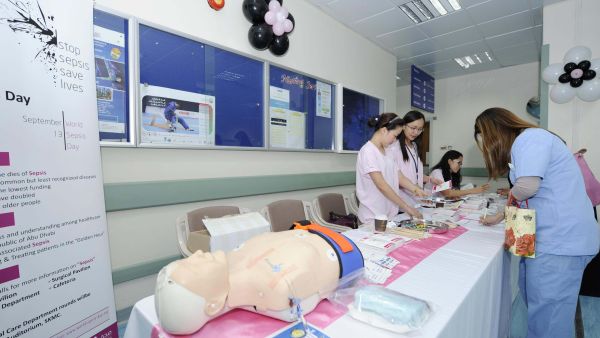Specialists at Sheikh Khalifa Medical City urge public to raise sepsis awareness on World Sepsis Day - 13 September

As part of World Sepsis Day, Sheikh Khalifa Medical City (SKMC), managed by Cleveland Clinic, organised an awareness campaign about sepsis.
To coincide with World Sepsis Day on 13 September, SKMC hosted activities on campus as well as lead a medical symposium in the evening focusing on the blood infection.
The campaign contributed to the goal of SKMC aimed at reducing the incidence and death from sepsis. The framework is carried out in accordance with the highest international standards, and through the application of best medical practices.
Experts urged members of the public to be alert to the symptoms of sepsis which occur when an infection travels through the human body. Sepsis is more likely to occur in those that are old or bedridden, have had recent surgery, have thin tubes such as catheters in their bodies, or those whose immune systems have become weak.
“Not many people are fully aware of the symptoms of sepsis, which include fever, chills, rapid heartbeat and problems with breathing, as well as confusion and cold, clammy skin. If not treated quickly, sepsis can become severe and dangerous,” said Dr. Hubert Hon, Chair of Critical Care Medicine at SKMC.
“Sepsis is a medical emergency, and we need to ensure the public are well aware of the signs and dangers associated with this illness. Despite its remarkable incidence, sepsis is practically unknown to the public and is often misunderstood as blood poisoning,” added Dr. Kalpana Krishnareddy, Consultant Physician in Intensive Care at SKMC and licensed by the UK General Medical Council.
World Sepsis Day is an initiative of the Global Sepsis Alliance, a group of non-profit organisations dedicated to increase both public and professional awareness of sepsis. Sepsis is one of the most common deadly diseases across the globe, and is one of the few conditions that strike with equal ferocity in both resource-poor areas and the developed world.
In the developed world, sepsis has dramatically increased by an annual rate of between 8 and 13 percent over the last decade, according to the Global Sepsis Alliance. The infection now claims more lives than bowel and breast cancer combined.
Sepsis remains the primary cause of death from infection despite advances in modern medicine, including vaccines, antibiotics, and acute care. The hospital mortality rate for sepsis sufferers is estimated to be between 30 and 60 percent.
SKMC is part of the SEHA HealthSystem.
Background Information
Sheikh Khalifa Medical City
Sheikh Khalifa Medical City (SKMC) is located in Abu Dhabi City.The flagship institution for the public health system in Abu Dhabi, SKMC has several centers of excellence and provides comprehensive services in all healthcare disciplines relevant to the needs of the community.
SKMC is the largest hospital in the UAE, consisting of a 586-bed tertiary hospital, 14 outpatient specialty clinics, and the Abu Dhabi Blood Bank, all of which are accredited by the Joint Commission International. SKMC is also accredited as a Cycle IV Chest Pain Center with Primary Angioplasty Intervention, having been the first outside the USA to achieve Cycle III recognition and only the 12th worldwide to do so. It is also accredited by the College of American Pathologists for its Main Laboratory and the Abu Dhabi Blood Bank. SKMC also manages a 125-bed Behavioral Sciences Pavilion and an Urgent Care Center.
SKMC is a member of the SEHA HealthSystem, which is responsible for managing and developing public hospitals and clinics in the Emirate of Abu Dhabi. For further information on SEHA, please visit www.seha.ae.
SEHA HealthSystem
SEHA is the corporate marketing name of Abu Dhabi Health Services Company, an independent public joint stock company that owns and operates all public hospitals and clinics across the emirate. ‘SEHA’ is a phonetic rendering of the Arabic word for health.
The company was established by Emiri Decree No 10 of 2007 and is a leading participant in the reform of Abu Dhabi’s healthcare sector. The reform seeks to upgrade and improve healthcare delivery to the public at a level comparable to the finest healthcare systems in the world. The program began by separating management and regulation – SEHA assumed responsibility for public healthcare centers and hospitals, while Health Authority-Abu Dhabi (HA-AD) was established to regulate the public and private sectors. The two organizations replaced the General Authority for Health Services (GAHS), previously responsible for both roles.






